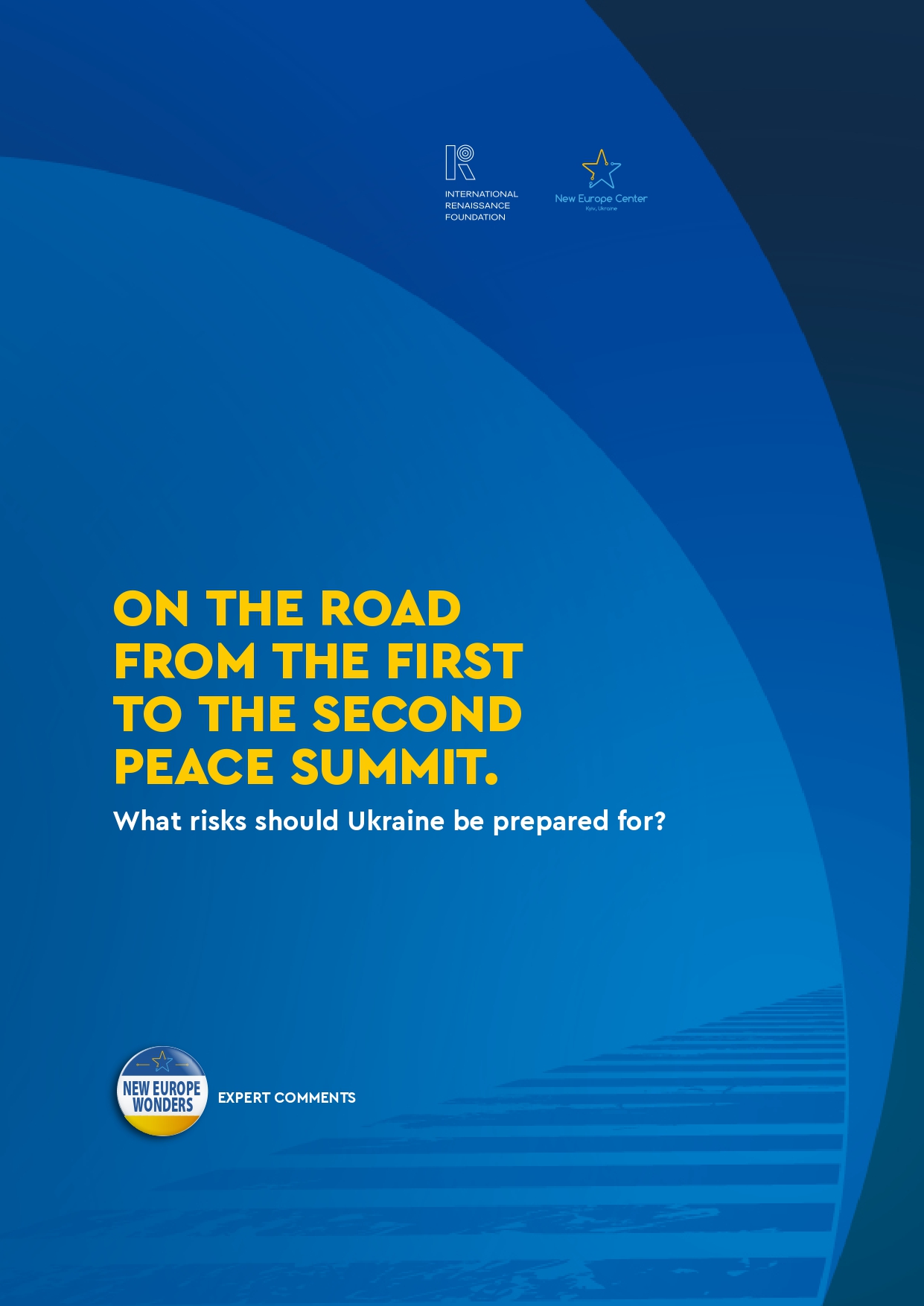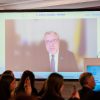
Ukraine plans to conduct second Peace Summit till the end of the year (from other sources — at the beginning of the next year). For now, there are no information about the location or the participants, and the main mystery is the participation of Russia. While Ukraine and its partners believe that Moscow should be present at this Summit, Russia itself is sending unambiguous signs: it will not get involved on Kyiv’s terms (another demand — withdrawal of Ukrainian troops from Kursk oblast). New Europe Center, in partnership with TSN.ua, decided to ask foreign experts: what risks should Ukrainians be prepared for on the road from the first to the second Peace Summit? We are pleased to bring you a new issue of the traditional “New Europe Wonders” rubric.
Some of the key thoughts from our experts:
- Russia might still not be interested in real negotiations by early 2025.
- The international community would pressure Ukraine to take an even more flexible negotiating position to persuade Russia to participate in the summit.
- Alternative peace plans would emerge as an artificial alternative to the Ukrainian Peace Formula.
- Russia would try to enhance its negotiation position, both militarily and diplomatically.
- The main risk for Ukraine is the so-called “peace offensive”. Moscow would try to convince world public opinion that Ukraine is standing in the way of a peaceful resolution to the conflict.
- It is crucial to end the hostilities, but not at the cost of Ukraine’s concessions – giving up sovereignty over its own territories or giving up future membership in the EU and NATO.
- Ukraine will have to demonstrate that the Kursk operation is only the first step towards a broad reconquest of its territory and its sovereignty.
James Jay Carafano, Senior Counselor to the President and E.W. Richardson Fellow, The Heritage Foundation (USA)[1]
Think we all agree, the number one priority is a free and independent Ukraine and ending the suffering of the Ukrainian people — who never asked for war. An ending of hostilities that stops the killing and suffering of innocents is, of course, an important goal and it matters less in the near term what the framework to achieve that is, whether it is a de facto ceasefire or a more formal agreement. What is key for Ukraine’s future is the country cannot relinquish sovereignty over any territory, whether it is occupied or not, nor should Ukraine’s aspirations for eventual membership in the European Union or NATO be excluded — these memberships are the long-term promise of security and prosperity as part of a Europe whole, free, prosperous, and at peace. In the near term, what is most important is the continued development of Ukraine’s conventional military deterrence and capacity to protect the Ukrainian people as well as rebuilding the Ukrainian economy and recovering from the devastation of war. These two tasks are vital to the future of Ukraine and Europe. Think Ukrainian reconstruction could be an important task for the Three Seas Initiative.
Dr. Kristi Raik, Deputy Director, Head of Foreign Policy Programme, International Centre for Defence and Security (Estonia)
First, Russia might still not be interested in real negotiations by early 2025. This is closely related to the second risk, namely that the West remains afraid of Russia’s defeat. To start meaningful negotiations requires that Russia will no longer believe it can achieve its goals by continuing the aggression. So far the Kremlin expects that the West will sooner or later become exhausted or distracted from supporting Ukraine and will press for a peace deal on terms that are favourable to Russia. The uncertainty about US support to Ukraine after the November presidential elections is encouraging for Putin, although no one really knows if the next US president will bring a positive turn for Russia.
The Peace Summits provide an opportunity for Ukraine to keep its peace plan in the attention of the international community and highlight the importance of this war for global order. It is hard for anyone to explicitly object Ukraine’s goals which are based on international law. Whether it is possible to achieve these goals unfortunately depends on brutal reality on the battlefield. Ukraine’s impressive surprise attack on Russian territory can improve its negotiating position. It is already having an important psychological effect on everyone — the Ukrainians, their Western supporters, Russians and countries sitting on the fence. Russia’s defeat no longer looks as impossible as it did for many observers just a few weeks ago.
Pierre Haroche, Associate Professor of European and International Politics, Catholic University of Lille (France)
The next peace summit is likely to be riskier than the first one, partly because of its proximity to the US presidential election and partly because of Russia’s possible participation.
The main risk would be for Ukraine to undergo what was known during the Cold War as a “peace offensive”. In this scenario, Moscow would formulate proposals designed to give it the appearance of goodwill and convince world public opinion that Ukraine is standing in the way of a peaceful resolution to the conflict.
In this context, the ongoing invasion of the Kursk region by Ukrainian armed forces is of not only military but also political importance, as it prevents Russia from presenting itself as the proponent of a solution reflecting the “reality on the ground”. As long as Ukrainian soldiers occupy Russian soil, Russia will be forced to either explicitly support the continuation of the war or offer concessions in exchange for its lost territories.
A second risk for Ukraine is to give the impression that there is nothing of substance to discuss and that the aim of the summit is only to signal broad international support for its cause, which could dissuade some neutral countries from participating. It is therefore important that Ukraine puts concrete proposals on the table. If Ukrainian forces are able to retain control of bits of Russian territory, a debate on the practicalities of a possible exchange of occupied territories under international supervision could be interesting.
Daniel Szeligowski, Head of Eastern Europe Programme at the Polish Institute of International Affairs (PISM) (Poland)
Ukraine must prepare for three significant risks on its road to peace in the second half of the year.
First, that the international community would pressure Ukraine to take an even more flexible negotiating position to persuade Russia to participate in the summit. Ukraine has shown a constructive stance by putting forward its peace plan and painstakingly building an international coalition around it, but Kyiv must be ready that not all its partners would share this sentiment and still prefer having Russia on board just for the sake of having it.
Second, that the alternative peace plans would emerge as an artificial alternative to the Ukrainian Peace Formula. China, in particular, has the potential to build a rival peace agenda and gain international support for it, especially in the countries of the Global South. Even if this plan is not entirely in line with Russian interests, it will inevitably presuppose painful compromises for Ukraine that Ukrainian society is not ready for.
Third, that Russia would try to enhance its negotiation position, both militarily and diplomatically. Regardless of the current offensive on Russian territory, Ukraine should expect Russia to escalate the situation on the frontline and continue to push for a ceasefire as a prerequisite for talks, hoping this would effectively solidify Russian territorial gains.
Marco Di Liddo, Director, Centro Studi Internazionali (Italy)
There are several risks that Ukraine faces in anticipation of the second Peace Summit. First of all, Kyiv will have to try to neutralize a general feeling linked to the fact that the future of the conflict will depend on the outcome of the US elections. In fact, it cannot be underestimated that the commitment of the West, including Europe, in supporting Ukraine has depended on the US locomotive. If this locomotive were to stop or slow down, Europe could lose the strength of the Atlantic drive and review its commitments. The second risk is the polarization of the front between the West and the Rest of the world. In fact, the conflict in Ukraine is interpreted by a large part of the non-European world as a global confrontation between the old and privileged West and the “new world” that is advancing and that wants to change the political rules and international balances. Therefore, Kyiv must bring attention back to the regional nature of the conflict and not to its global repercussions. The third risk, which however now seems to have diminished, is that both the Kremlin’s partners and allies will become convinced that Ukraine cannot win the war and, therefore, will push for a territorial compromise in the long run. In this sense, the Kursk incursion has given new optimism towards the Ukrainian Armed Forces but, at the moment, it has not yet taken on the characteristics of a “game changer”. Ukraine will have to demonstrate, on the contrary, that the Kursk operation is only the first step towards a broad reconquest of its territory and its sovereignty.
Sean McFate, PhD Professor, The School of Foreign Service at Georgetown University, The Maxwell School at Syracuse University, author of The New Rules of War book. An Economist “Book of the Year (USA)
I think the Ukrainian offensive into Kursk risks to become Kyiv’s ‘Battle of the Bulge” from WW2. Offensive operations are more resource intensive to sustain than defensive ones, and I worry that Moscow will wait you out, encircle, and capture those forces. I think you should commit instead to irregular warfare means and way to achieve your ends, such as strategically disruptive attacks deep inside Russia that hobble its ability to fight. There are many ploys that could have been used. Wagner Group and Prigozhin were lost opportunities. More cunning and creative thinking is needed, otherwise it looks like WW1 war of attrition to me.
Putin craves superpower status and US respect, and views European nations as derivative. He also needs to wait for the US presidential election to conclude. Hence the delay.
There can be no peace summit without the all the warring parties there. I think nothing will happen until the US presidential election concludes. Even if there is a successful peace summit, say next spring earliest, I think Moscow will likely cheat. Putin’s interests in Ukraine will never diminish. To counter it, I think Ukraine needs less Goliath and more David. It needs to find a way to attack Putin’s regime rather than his troops.
[1] Some of the experts provided their comments before the Kursk operation of the Armed Forces of Ukraine, which began on 6th of August 2024
PDF-version is here.
The rubric is prepared with the support of the International Renaissance Foundation. The material reflects the position of the experts and does not necessarily coincide with the position of the International Renaissance Foundation.







